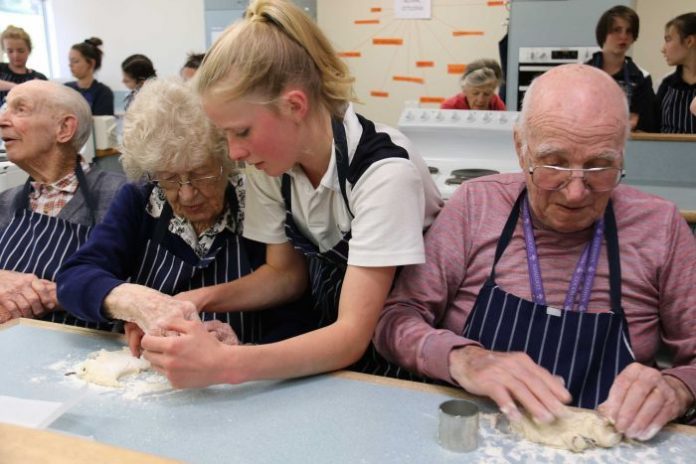Shared sites that bring older and young people together can help tackle some of the big social ills facing Brexit Britain – from poor health and care and loneliness to ageism and division.
Urgent action is needed to create 500 shared sites across the country by 2022 and end ‘age apartheid’ in Brexit Britain, according to think tank United for All Ages in its Mixing Matters report.
Britain is one of the most age segregated countries in the world, particularly for the oldest and youngest generations, says the report in its analysis of recent research.
Age segregation has been growing in recent decades, exacerbated by trends in housing, work and community life.
This has led to trust being halved between different age groups, growing loneliness amongst both young and old, and poorer physical and mental health. It has also been reflected in voting divisions between younger and older people in the 2016 EU referendum and 2017 general election.
The new Mixing Matters report highlights the growth of shared sites in 2017 – from the first ‘care-home nursery’ at Apples and Honey Nightingale in south west London and the first eldercare day centre at a primary school in Essex to increasing links between nurseries, parent and toddler groups and schools with older people’s housing and care schemes.
The report calls for 500 shared sites to be developed by 2022 across the UK, where activities for older and young people take place alongside each other and together.
Experience in the USA, Singapore, Japan and elsewhere in Europe shows the benefits for all generations of shared sites where old and young can mix.
These include improved learning and social development for young children, better care and quality of life for older people, more opportunities for families and care staff, as well as economic benefits for providers of childcare, housing and care.
In addition to creating more shared sites like care-home nurseries, Mixing Matters argues for other models of shared sites to be developed bringing young and old together:
These include up sheltered housing schemes to students in return for volunteering and support, expanding the Homeshare scheme where older people let spare rooms to young people in return for practical support and companionship; and creating new purpose-built intergenerational housing developments
Locating reception and year one classes for primary school children in care homes, as demonstrated by shared sites in the USA; and tackling stigma around ageism and dementia by school pupils visiting care homes as part of the curriculum
Creative options for downsizing that free up family-sized homes for young people, including ‘downsizing in situ’ by sub-dividing larger properties owned by older people
Developing more community hubs and community pubs where different generations can mix and share key community facilities that are ‘more than a pub’, supported by councils transferring assets to local communities
Engaging the next generation of care and childcare students in intergenerational interaction through their college placements with providers of care for older and young people, thereby creating a lasting impact across three generations while promoting recruitment and retention for the hard-pressed care workforce
Mixing Matters features contributions from some twenty national organisations concerned about improving relations between the generations – ranging from Anchor and the Intergenerational Foundation to St Monica Trust and New Economics Foundation. They have all shared ideas and projects to bring younger and older people together through shared sites.
Writing in the report, Chuka Umunna MP, chair of the All Party Parliamentary Group on social integration which is holding an inquiry into intergenerational connection, says: “There is growing political will to build bridges across a number of social divides, including age, which were brought into sharp focus by recent political events such as the EU referendum and the 2017 General Election. I believe our APPG’s inquiry – through championing schemes and the exploration of new policy approaches – has the power to convert this growing political will into practical action.”
Stephen Burke, director of United for All Ages, said: “Brexit Britain is dogged by divisions – we are divided by class, income, race, geography and age. The mistrust that arises from such divisions is fuelled by the lack of connection between different generations. This can breed myths and stereotypes, misunderstanding, ageism and exclusion. That’s why we believe mixing matters.
“2017 saw significant progress in bringing older and young people together for the benefit of all generations and our wider society. Many more examples can be found in other countries, but there has been a growth in the UK of ‘shared sites’ from nurseries co-locating with care homes and older people’s housing to schools, sheltered housing and community hubs.
“While the government is absorbed with delivering Brexit, Britain is crying out for positive change. Economically, more needs to be done to address intergenerational fairness through affordable housing, wealth and taxation. Socially, mixing through shared sites could provide thousands of opportunities across the country to bring people together for the benefit of all generations.
“Local people and their communities are taking the lead. By 2022 United for All Ages hopes to see at least 500 shared sites across the UK. Many will build on existing activities and facilities. Some will be based in new developments.
“The joy of mixing can unite Brexit Britain in these divided times. As surveys repeatedly show, older and younger generations have much more in common than some would have us believe. Now’s the time to make shared sites happen because mixing matters for everybody.”







